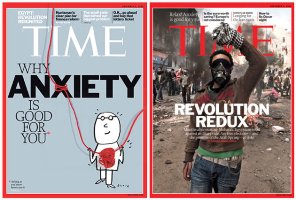 The TIME Magazine cover article from December 5, 2026, by Alice Park titled The Two Faces of Anxiety has raised a bit of a ruckus online. Mostly, bloggers have questioned the choice to make Why Anxiety Is Good For You the cover art in the United States, while a graphic image of the Egyptian revolution was published in Europe, Asia, and the South Pacific editions. It has been questioned whether TIME believes Americans do not care about world events or are simply that self-focused. It seems to me that the editors of TIME simply believe “anxiety” is a buzzword that will sell in America, and apparently more than an uprising in Egypt. This seemed even more likely after watching the interview the senior editor of TIME did with CNN to discuss the problem of anxiety that they claim 18 percent of American adults suffer from.
The TIME Magazine cover article from December 5, 2026, by Alice Park titled The Two Faces of Anxiety has raised a bit of a ruckus online. Mostly, bloggers have questioned the choice to make Why Anxiety Is Good For You the cover art in the United States, while a graphic image of the Egyptian revolution was published in Europe, Asia, and the South Pacific editions. It has been questioned whether TIME believes Americans do not care about world events or are simply that self-focused. It seems to me that the editors of TIME simply believe “anxiety” is a buzzword that will sell in America, and apparently more than an uprising in Egypt. This seemed even more likely after watching the interview the senior editor of TIME did with CNN to discuss the problem of anxiety that they claim 18 percent of American adults suffer from.
As I read the article, it seemed that it was written using anxiety and stressor interchangeably. Much of the article included things that I teach about stress with individual clients and in the course It’s a Jungle Out There!
Stress and anxiety are not the same thing. Anxiety can be a reaction to stressors, but it is not the only reaction. Stress is commonly used to describe distress, which can include anxiety, but there are also other reactions such as depression. The article also seems to refer to stress as a motivating factor. The positive reaction to stressors is called eustress and would be a motivating factor. Sally Winston, co-director of the Anxiety & Stress Disorders Institute of Maryland (ASDI) is quoted as saying, “Anxiety itself is neither helpful nor hurtful. It’s your response to your anxiety that is helpful or hurtful.”
Perhaps I am getting hung up on semantics, but to me, stress and anxiety are very different. One is a treatable diagnosis, and one is a fact of human existence. Living with an elevated adrenaline level can lead to anxiety, but the adrenaline response itself is not anxiety. Adrenaline levels are raised when we are physically active as well, which actually helps lower anxiety long term. I am concerned that the TIME article seems to romanticize anxiety and the adrenaline response without fully analyzing the negative impact the adrenaline response (unchecked) can have on your physical health. I did like the quote from Diego Pizzagalli of Harvard Medical School, director of the Center for Depression, Anxiety & Stress Research at McLean Hospital who said, “What is important is your appraisal of the situation and your assessment of your coping strategies. If you perceive you can cope, you will not feel as stressed.”
When it comes to coping skills, I was somewhat concerned by the statement that anti-anxiety medications do not help people develop coping skills. While it is true that medications do not automatically encourage us to develop new coping skills, at times, medication can make it possible for someone to focus enough to work on practicing and mastering new coping skills. Medication is generally not the only answer for most mental health diagnoses, but often it can give a person a boost to help them work on the more cognitive and behavioral aspects of overcoming difficulties. This is a discussion I often have with clients whether the problem is anxiety, depression, or even ADHD.
Also Read:
